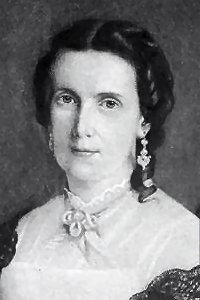Introduction
Born: May 19, 1820, Milton, Pennsylvania.
Died: March 28, 1897, Baltimore, Maryland.
Buried: Stonewall Jackson Memorial Cemetery, Lexington, Virginia.

Born: May 19, 1820, Milton, Pennsylvania.
Died: March 28, 1897, Baltimore, Maryland.
Buried: Stonewall Jackson Memorial Cemetery, Lexington, Virginia.

Margaret was the daughter of George Junkin (one time president of Washington College, Lexington, Virginia) and Julia Rush Miller, wife of John Thomas Lewis Preston, and sister-in-law of General Thomas J. Stonewall
Jackson.
Of all the nights of most mysterious dread,
This elded earth hath known, none matched in gloom
That crucifixion night when Christ lay dead,
Sealed up in Joseph’s tomb!
No faith that rose sublime above the pain,
Remembered in its anguish what He said:
“After three days, and I shall rise again,”—
Their hopeless hearts were dead.
Throughout that ghastly “preparation-day”
How had the stricken mother dragged her breath!
Like all of Adam born, her God-given lay
Beneath the doom of death.
The prophecy she nursed through pondering years
Of apprehension, now had found its whole
Fulfillment, infinite beyond her fears—
The sword had pierced her soul!
The vehement tears of Peter well might flow,
Mixed with the wormwood of repentant shame;
Now would he yield his life thrice told, if so
He might confess the name
He had denied with curses. Fruitless were
The keen remorses now, the gnawing smart;
A heavier stone than sealed the sepulchre
Was rolled above his heart.
Surprise and grief and baffled hopes sufficed
To rush as seas, their souls and God between;
Yet none of all had mourned the buried Christ
As Mary Magdalene.
When all condemned, He bade her live again;
When all were hard, His pity poured above
Her penitent spirit, healed it, cleansed its stain,
And made it pure with love.
And she had broken all her costliest store
O’er Him whose tenderness, so new, so rare.
Stood like a strong, white angel evermore
’Twixt her and mad despair.
And He was dead! Her peace had died with Him
The demons who had fled at His control,
With seven-fold chains within their dungeons dim,
Would henceforth bind her soul.
How slowly crept the Sabbath’s endless week!
What aching vigils watched the lingering day,
When she might stagger through the dark and seek
The garden where He lay!
And when she thrid her way to meet the dawn,
And found the gates unbarred, a grieving moan
Brake from her lips: Who
—for her strength was gone—
Will roll away the stone?
She held no other thought, no hope but this:
To look, to touch the sacred flesh once more,
Handle the spices with adoring kiss,
And help to wind Him o’er.
With the fair linen Joseph had prepared,
Lift reverently the wounded hands and feet,
And gaze, awe-blinded, on the features bared,
And drink the last, most sweet,
Divine illusion of His presence there;
And then, the embalming done, with one low cry
Of utmost, unappeasable despair.
Seek out her home, and die.
Lo! the black square that showed the open tomb!
She sprang—she entered unafraid—and swept
Her arms outstretching, groping through the gloom,
To touch Him where He slept.
Her trembling fingers grasped the raiment cold,
Pungent with aloes, lying where He lay:
She smoothed her hands above it, fold by fold—
Her Lord was stolen away!
And others came anon, who wept Him sore—
Simon and John, the women pale and spent
With fearful watchings; wondering more and more,
They questioned, gazed—and went.
Not thus did Mary. Though the lingering gloom
Pearled into brightness, and the city’s stir
Came floating upward to the garden tomb,
There was no dawn for her.
No room for faintest hopes nor utmost fears;
For when she, sobbing, stooped, and saw the twain
White-clothed angels, through her falling tears,
Sit where her Lord had lain,
And ask, Why weepest thou?
there brake no cry,
But she with deadened calm her answer made:
Because they have taken away my Lord, and I
Know not where He is laid.
Was it a step upon the dewy grass?
Was it a garment rustled by the wind?
Did some hushed breathing o’er her senses pass,
And draw her looks behind?
She turned and saw—the very Lord she sought—
Jesus, the newly risen!…but no surprise
Held her astound and rooted to the spot;
Her filmed and holden eyes
Had only vision for the swathed form;
Nor from her mantle lifted she her face,
Nor marveled that the gardener’s voice should warm
With pity at her case;
Till sprang the sudden thought, If he should know
—
And then she turned full quickly: Sir, I pray,
Tell me where thou hast borne Him, that I may go
And take Him thence away.
The resurrection morning’s broadening blaze
Shot up behind, and clear before her sight
Centered on Jesus its transfiguring rays,
And haloed Him with light.
Mary!
—The measureless pathos was the same
As when her Lord had said, Thou art forgiven.
Had He, for comfort, named her by her name
Out from the height of heaven?
She looked aloft—she listened, turned, and gazed;
A marvelous revelation swept her brow;
One moment, and she prostrate fell, amazed,
Raptured—Rabboni! Thou!
Margaret Junkin Preston
For Love’s Sake, 1886